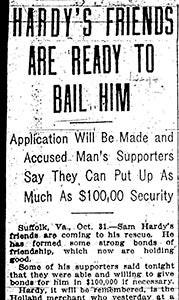The murder of Grac Jones: Chapter 8
Published 7:51 pm Monday, August 3, 2015
The public reaction
EDITOR’S NOTE: On the evening of Oct. 26, 1908, five shots rang out in the village of Holland. Tiberius Gracchus “Grac” Jones lay dying on the ground inside the gate leading to his home. “They have killed me and killed me for telling the truth,” he told a friend as his life ebbed away. This is the eighth in a series of articles about the Jones murder case. Suffolk historian Kermit Hobbs Jr. compiled the 18-part series from personal accounts, newspaper stories and court records he has studied from the period.
By Kermit Hobbs Jr.
Special to the News-Herald
The news of Sam Hardy’s arrest made it clear just how popular Hardy was in the Holland community and, perhaps conversely, how little regard there was for the life of Grac Jones.

Accused killer Sam Hardy had plenty of friends, it seems. They were willing to put up $100,000 of their money and property to get him out of jail. (Submitted Image)
Headlines in the Nov. 1, 1908, edition of the Virginian-Pilot proclaimed, “HARDY’S FRIENDS ARE READY TO BAIL HIM.” The report stated that Hardy’s supporters had pledged as much as $100,000 security to free him from jail. However, legal obstacles arose that prevented consideration of this request before Hardy’s case came before a preliminary trial.
With a few notable exceptions, people of the Holland community stood firmly behind their beloved storekeeper. During the inquest, Hardy had handled himself admirably. He had candidly admitted to making threats against life of Grac Jones, but he calmly insisted that he had always qualified them with the phrase, “if he comes in my store.”
Without emotion, Hardy denied that he had killed Grac Jones.
Hardy’s circumspect demeanor was a contrast with the excessive behavior Grac Jones had demonstrated in the months since their disagreement over the allegedly destroyed will. Even the anger demonstrated by Grac’s brother, Bunyan, at the inquest made the gentlemanly Hardy appear innocent by comparison.
Hardy was given the greatest possible comfort in his cell in the Nansemond County Jail. His friends paid to have all his meals brought in from a local hotel in Suffolk.
In 1984, more than 75 years after Hardy’s confinement in the jail, James Edward Oliver recalled visiting Sam Hardy in his cell. Oliver was a friend of the jailer’s son, and the two boys were allowed to visit Hardy on several occasions.
Oliver recalled, “He was a very handsome man who wore fine clothes which were neatly starched and pressed. He was very intelligent, pleasant to everyone and a highly respected gentleman to all his many friends…. Until the trial, I never saw anyone who believed that he killed Grac Jones.
“When Mr. Hardy was taken to jail, he had a private room which was especially equipped with a white iron bedstead, the best available at the time, and several comfortable chairs for himself and his many visitors. He always had fresh apples, oranges, candy, nuts and notions to share with his visitors…. The other prisoners had such great respect for Mr. Hardy that they always kept quiet even when we children went to visit.”
Even as Sam Hardy sat in his cell awaiting his trial, his friends in Holland prepared to offer testimony that would prove his innocence. Five different people came forward, claiming that they had witnessed Hardy’s sale of the mystery shotgun to the stranger from North Carolina.
Sam Pete Holland traveled to Norfolk and visited hardware stores, hoping to find an Ithaca shotgun identical to the murder weapon that might be used to provide useful information.
Relatively few people mourned the loss of Grac Jones. One newspaper writer lamented, “For Jones, after the shock of the tragedy had spent its force, there was a remarkable lack of sorrow — remarkable in the fact that Jones had been a good citizen and an upright man, just in his dealings and clean in his personal life. His lack of popularity was not so remarkable when another aspect of the man was considered, for Jones had in him all the elements of the determined reformer.”
Jones’ pride and his straight-laced righteousness had cost him the affection of his community.
TOMORROW: The preliminary trial






